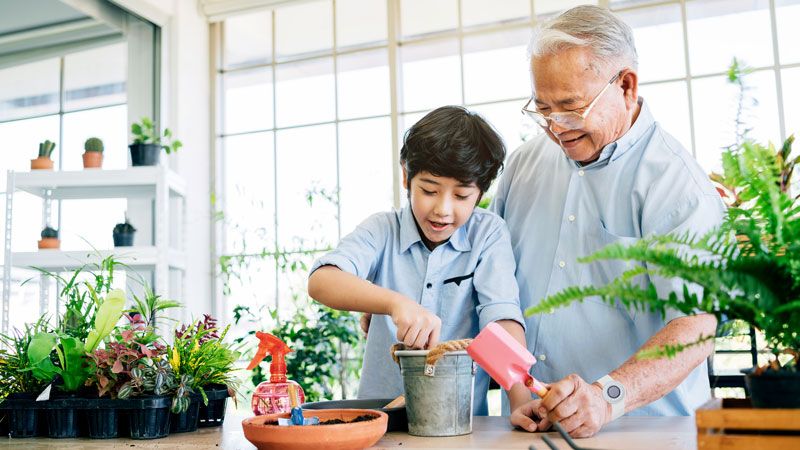Falling is the largest barrier to aging-in-place, but there are many simple ways to age-in-place successly but preventing falls.
The CDC estimates about 36 million falls are reported among aging adults every year. While osteoporosis and arthritis are common health conditions that may increase the risk of falls, most falls are preventable. Since September is Fall Prevention Awareness Month, we wanted to provide you the newest information about how to reduce falls, the benefits of aging in place, and the most recent studies on aging-in-place and falls.
What Is Aging In Place?
Aging-in-place means living in your own home as you grow older. The CDC defines aging in place as “the ability to live in one’s own home and community safely, independently, and comfortably, regardless of age, income, or ability level.”
According to results of a survey conducted by AARP, more than 77% of adults aged 50 and older want to age in place. To do so, one-third of study respondents said they would need to modify their homes to age safely and comfortably. Items such as, no-step showers, grab bars in bathrooms, and emergency response systems were a few of the modifications mentioned by survey respondents.
Benefits of Aging in Place
Other than a natural tendency to remain in what is most comfortable to us, aging-in-place offers a wide range of benefits, including a better quality of life, higher confidence, and self-esteem. Even when most people were forced to stay at home, many os use alone, aging-in-place still has its benefits.
In a 2022 study published in the Journal of the American Geriatrics Society, researchers learned that aging adults who sheltered in place during the COVID-19 pandemic became more confident about aging at home.
According to the study, pandemic-related restrictions forced many older adults to rely on themselves or face the risk of being infected by COVID-19. Most family members decided not to visit older family memebers, for fear of passing on an invisible illness. The study adds that, after restrictions ended, many aging adults reported feeling much more confident in their ability to age-in-place because believed they could face any challenges with aging at home.
Who is falling?
Falling is not limited to aging adults.
A 2022 report from the U.S. Government Accountability Office (GAO), shows that the highest rate of injuries from falling happen to adults with disabilities between the ages of 45 and 59. The GAO study mentions that most analyses on falls focus on older adults only, 60 and up. But falling can start much sooner, and the report recommends that agencies, like the CDC, begin examining the rate of falls among other age groups.
The GAO report also states that currently nine federal programs are working toward preventing falls among aging adults and adults with disabilities. Home safety assessments and railing and ramp installations are some of the many services offered by these federal programs to prevent falls.
Fall Prevention Tips
Since the pandemic, we are spending more time in our homes. It’s natural that more falls would happen in home and now is the perfect time to make our homes as safe as possible. Here are tips for fall prevention that can help low the probability of falling any day, but also as you age-in-place:
- Exercise regularly. Staying active can improve your strength, flexibility, and balance, and reduce your risk of falls and health conditions that may cause falls. Try to exercise on most days of the week doing activities like walking, hiking, biking, and swimming.
- Safety-proof your home. Install safety devices throughout your home like non-slip rugs, grab bars or ramps. Move furniture with sharp edges out of heavy traffic areas and remove any clutter that could contribute to a fall.
- Use a home alert system. A home alert system can connect you to emergency services immediately if you feel like you may fall or if you experience a fall. Getting help is extremely important during the “golden hour,” which is the first 60 minutes after you fall. After the golden hour, the risk of complications increases.
- Limit alcohol use. Any amount of alcohol can impair your balance and coordination, which increases the risk of falls, especially if you're taking medication.
- Know the side effects of medications. Dizziness, poor balance, and a lack of coordination are common side effects of many medications. Keep an eye out for these symptoms and tell your doctor right away if you experience them or others.
- Be careful on wet or icy surfaces. Wear boots or shoes with non-slip soles when it’s wet inside or icy outside. When you’re inside, wear non-slip socks to avoid falling.
- Take travel safe precautions. Use the mode of transportation you feel most comfortable with, especially if you’re prone to falling. Let someone use drive: Take the bus, train, or use ride-sharing services. If you’re driving, install a sturdy step-up on your vehicle if it’s too high.
- Stay in touch with friends, family, and caregivers. These individuals can come to your aid if needed. They can also check in on you regularly, especially on days you haven’t touched base with them.
At Medical Guardian, our goal is to empower you to live a life without limits. We offer home alert systems for seniors and a personal medical alert device with GPS for adults who want to stay active and healthy while enjoying their favorite activities.

